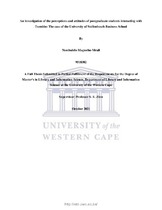An investigation of the perceptions and attitudes of postgraduate students interacting with Turnitin: The case of the University of Stellenbosch Business School
Abstract
Globally there is growing concern around increased levels of plagiarism. Gullifer and Tyson
(2010, p. 463) claim that plagiarism is growing at a rapid rate, and universities are now required
to devote enough time and resources to combating it. South African universities have also
found themselves to be victims of plagiarism. To prevent increased levels of plagiarism in
South Africa, Stellenbosch University (SU) promotes the use of Turnitin. The study described
in this thesis investigated postgraduate students’ and lecturer’s perceptions and attitudes
regarding plagiarism and interacting with Turnitin at the University of Stellenbosch Business
School to fill a research gap, as up to this point, this topic has not been studied. The study
adopted a mixed methods approach, which combined both quantitative and qualitative
methods. Moreover, the theory of planned behaviour informed the study.
The results show that a majority of the students and lecturers in the study were aware of
plagiarism and anti-plagiarism software, particularly Turnitin. However, the majority of
students still plagiarised intentionally, owing to factors that influenced their intention to
plagiarise, such as laziness and poor time management, and unintentionally, owing to poor
language, writing and referencing skills. The majority of students (98%) agreed that they made
use of anti-plagiarism software. Moreover, 80% of the students indicated that the use of antiplagiarism
software contributed to the promotion of academic integrity. Similarly, all lecturers
interviewed indicated that anti-plagiarism software helped to promote and improve academic
integrity.

